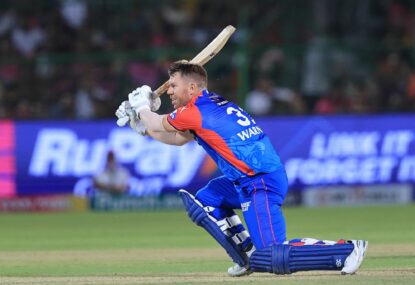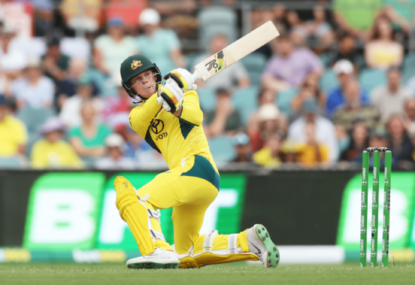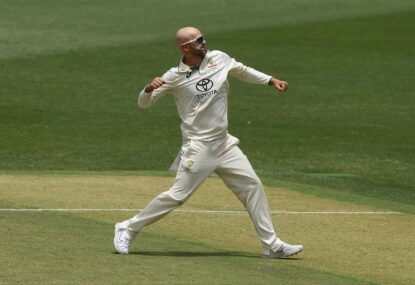Here are just a few sundries to make a more complete total in the fourth and final innings of comparisons between the dominance displayed by first the West Indies, and then subsequently Australia in the 30-year period from 1978 to 2008, with some slight overlapping at both ends.
Australia famously won eight Ashes series in a row from 1989 to 2002-03. During those eight series, they lost only seven Tests, and staggeringly, only one of them when the destiny of the Ashes was still undecided and that was the first Test of the 1997 series.
Less famously, Australia dominated almost all other teams to the same statistical extent around the same period. After drawing 1-1 in their first two series, home-and-away, against South Africa after readmission, Australia then won the following six series between the two teams from early 1997 until early 2006, and in those six series, South Africa did not win even a single, solitary Test when the series result had not yet been decided.
Against Pakistan, it was a similar slaughter: from 1995-96 until 2009-10, they met six times in a series, four times at home in Australia, once in Pakistan and once on neutral territory. During those six series, Pakistan won one solitary Test full stop, and that was a dead rubber. Starting in late 1999 and continuing until mid-2010, Australia won 13 successive Tests between the two countries.
Against New Zealand, Australia did not lose a single Test from 1993 until 18 years later. In this time frame, these two sides played 22 Tests against each other with Australia winning 16 of them, being robbed of certain victory by rain in at least another two, and then a further occasion when New Zealand’s final pair hung on for some ten overs to claim a draw to prevent a 3-0 clean sweep in the third Test dead rubber in 1997-98.
In the first 30 years of Test meets between Australia and Sri Lanka, from early 1983 until early 2013, Australia lost one solitary Test all up, and Sri Lanka are yet to record their first Test victory on Australian soil, a feat that Pakistan achieved in 1977 within their first 25 years as a Test nation. While the win ratio of 19 from 28 in this period is a little down compared to the other aforementioned countries, of the eight draws entailed, three were in the late 1980s and early ’90s before Allan Border retired, and another two in the rain-ruined series of late 1999.
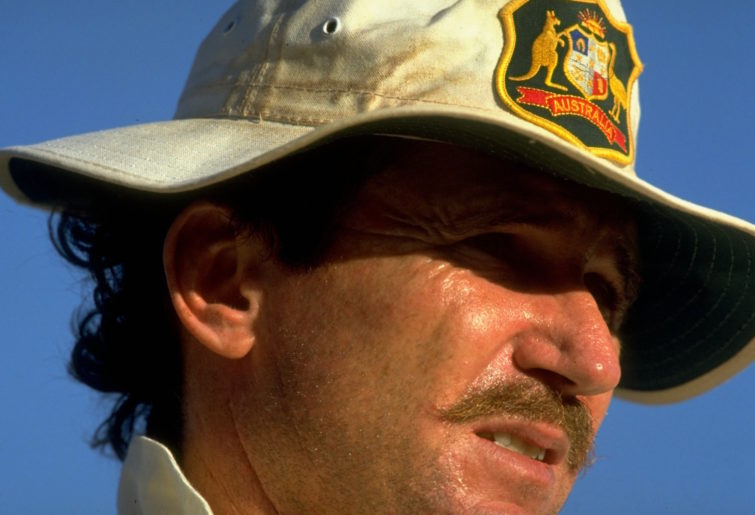
(Credit: Ben Radford/Allsport via Getty Images)
Only two teams were able to even remotely compete with Australia during the decade from early 1995 until early 2005, the West Indies during the second half of the 1990s only, and India only on their own soil and/or with Glenn McGrath missing from the attack.
Despite being thumped in both the 1995 and 1996-97 series, the West Indies actually managed to win two Tests that weren’t dead rubbers, and then a further two in the 2-2 drawn series of 1999. However, since then, they have suffered as bad, if not worse than all of the other teams, and is one of the few teams that Australia still dominates completely in Test cricket.
In the last 22 years, the West Indies have only won one solitary Test against Australia and that was a dead rubber way back in 2003. The other 25 times these teams met in a Test from late 2000 until early 2016 – the last time they met – Australia were victorious on 21 occasions. On only one of those 25 occasions did the West Indies look even a mere remote possibility of winning any individual Test, the second Test in Adelaide of the 2009-10 series, a match that Australia ended up saving quite comfortably.
Between 1991 and 2015, India were smashed when coming to Australia. In 24 Tests, the score line was 16-2 to Australia, with only one of those wins by India coming before the Border-Gavaskar trophy had either been regained or retained by Australia. Of the six draws, India were lucky to hang on in two of them, the last two Tests in the 2014-15 series.
In the six successive home summers from 1997-98 to 2002-03 inclusive, Australia lost only two Tests, both to England, and neither having any even potential bearing on the destiny of the Ashes.
Up until about World Series Cricket, England was the main rival for the West Indies, but the psyche of the (West Indian) players had shifted to series versus Australia by the end of the 1980s to early ’90s at the latest.
The West Indies went longer in both years and number of series without being beaten by England from 1969 until 2000 during which time they played 13 series. The West Indies longest series winning streak against this same opponent was seven, from 1976 until 1990 inclusive. During those aforementioned 31 years, not counting the 2000 series when the run was broken, the West Indies were victorious in 34 out of 65 Wisden Trophy Tests, a percentage of 52.3 compared to Australia’s Test winning percentage of 65.1 during their 19-year undefeated Ashes streak during which they won all eight series.
The West Indies lost eight of those 65 Tests or 12.3 per cent compared to Australia’s 16.3 per cent. However, whereas Australia only lost one solitary Test when the destiny of the Ashes was still on the line, six of those aforementioned eight times England beat the West Indies, the Wisden Trophy was still up for grabs by either side.
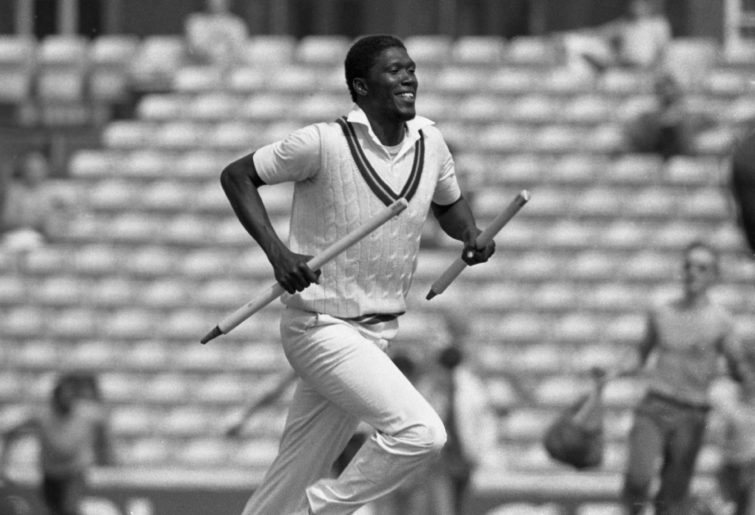
(Mark Leech/Getty Images)
After Pakistan beat the West Indies at home in 1958-59, another 16 years passed before they played each other again for a drawn series, right about the time both teams were starting to become genuine cricketing powers. Starting from 1974-75, the West Indies were undefeated to Pakistan until 1997-98, during which time the ledger was three series wins to the West Indies with four drawn, three of which were actually during the West Indies’ period of being most powerful in the 1980s. The overall Test numbers were eight won, four lost and nine drawn.
Discounting a one-off Test in India during World Series Cricket, the West Indies were undefeated in a series by India from 1971 until 2003 during which time they played nine series, winning seven of them. However, even during their most dominant decade, the 1980s, they won only nine out of 19 Tests between the two sides, although they lost only one.
The West Indies went 13 years, from 1987 until 2000 without losing a Test match to New Zealand, although only two mini Test series of two Tests each, one home, and one away, were played between the teams during this period. The West Indies won two of those four Tests.
It was a similar story with Sri Lanka, who, prior to the complete collapse of Calypso cricket post 2000, the West Indies only played in three Tests, winning one and drawing two, one of them rain-ruined, the inaugural Test between the two teams in Sri Lanka in early 1993.
The only individual opponent results that remains to be dissected is how much the West Indies dominated Australia from the end of World Series Cricket until the last time until, but not including, the next time Australia beat them in a Test series. Between 1979 and 1993 inclusive, these two teams played each other in two three-Test series, and five five-Test series. Only one of those series was drawn, the other six won by the West Indies, including five in a row from 1984 until the aforementioned 1993. The West Indies won 16 out of 31 matches, losing only five, only two of which were while the Frank Worrell Trophy was still in limbo.
Those 31 Tests discussed in the previous paragraph actually constituted precisely the entire West Indian part of Allan Border’s Test career. He never tasted series victory against the West Indies, just as none of Michael Atherton, Nasser Hussain, Graham Thorpe, Alec Stewart and Darren Gough never tasted Ashes victory among the finer of England’s playing personnel during that 1989 to 2003 period. They, as well as Ian Botham’s entire generation, more or less, never played in a winning Test series against the West Indies.

(Photo by Adrian Murrell/Allsport/Getty Images/Hulton Archive)
So, which Australian players from the 1995 to 2008 period have the best records in terms of playing in series defeats the least number of times during their entire career, both within, and outside this time frame?
There is only one significant player from this period who never tasted series defeat his entire Test career, and that is Stuart MacGill with 208 wickets in 44 Tests. The closest he came was being on the 1999 Sri Lankan and 2005 Ashes tours without playing a Test. Matthew Elliott also never played in a series defeat but his career was much shorter, playing in just 21 Tests. Adam Gilchrist played in only two series defeats over a 96-Test career, in India 2001 and the 2005 Ashes. Significantly, in the six Tests Australia did not win across those two series combined, four of which were lost, Gilchrist underperformed, with a top score of only 49 not out.
Glenn McGrath is the next best at not playing in series defeats, if we consider the fact that he did not play in either of the two Tests that England won in 2005, while being far and away the star bowler in the sole Test that we won comprehensively (in the 2005 Ashes), and the 1999 series in Sri Lanka being effectively reduced to a one-off Test on account of copious amounts of rain in Tests two and three. Allowing for those mitigating circumstances, McGrath was only defeated twice in Test series, very narrowly in Pakistan in late 1994, and equally as narrowly in India in 2001, when the riveting battle between him and Sachin Tendulkar in the deciding third Test is probably what clinched the series for India.
Of pre-1990s players, Bradman played in Test series defeats twice, while 1930s colleagues Stan McCabe and Bill O’Reilly only once a apiece, the Bodyline series, although both, 39 and 27 respectively, played fewer Tests than the aforementioned MacGill. Bill Brown never played in a losing Test series, but his 22 Tests are only one more than the aforementioned Matthew Elliott.
Players from the West Indies era of dominance from 1979 until 1991 who compare or even outdo these aforementioned Aussies include Malcolm Marshall, 81 Tests, Jeff Dujon, also 81 Tests, Larry Gomes, 60 Tests, Gus Logie, 52 Tests, and Patrick Patterson, 28 Tests, none of whom ever played in a Test series defeat.
Joel Garner, Michael Holding, Colin Croft, Viv Richards, Andy Roberts, Desmond Haynes and Richie Richardson all only ever played in one solitary Test series defeat, Richards’ being the 1975-76 series in Australia.
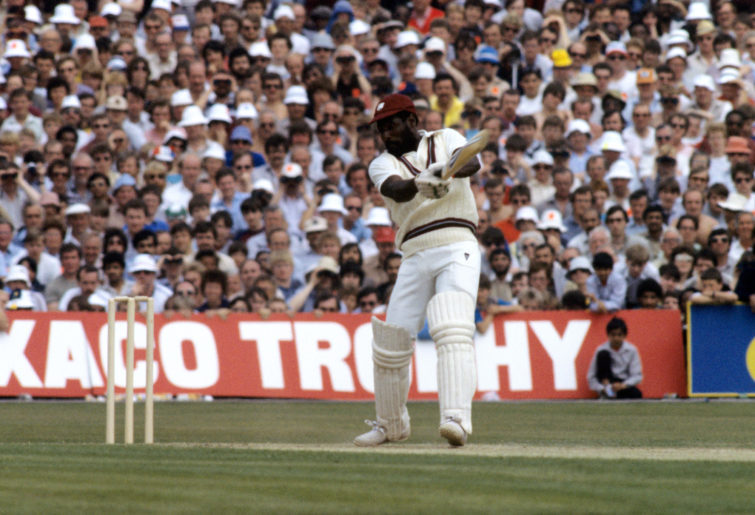
(S&G/PA Images via Getty Images)
Missing the 1980 series in New Zealand, Richards (1976-91) surely holds the record for the longest streak of not playing in a Test series defeat in both number of series, as well as years, given that Bradman, by his own admission, would not have still been playing post 1945 had there been no Second World War.
They are too numerous to list, but no West Indian player who debuted after 1969 and retired prior to 2000 ever suffered a Test series defeat to England and none who debuted after early 1976 and retired prior to 1995 ever suffered a series defeat at the hands of Australia. However, no Australian player who debuted after February 1993, irrespective of whether already retired or still playing, has ever played in a series defeat against the West Indies. No Australian player who debuted after May 2003 has ever even lost a Test match to the West Indies, and the only other team this can be said for is Zimbabwe, not counting other minnows we are yet to play an inaugural Test against.
Finally, with the Ashes always remaining the pinnacle for Australia’s Test team, irrespective of the strength of English teams from one series to another, there were five Australian players from the 1989 to 2003 period who were never on the losing end of an Ashes series, if we allow McGrath the same earlier mitigating latitude. The other four are Mark Taylor and Ian Healy, both of whom played in six Ashes series, Mark Waugh who played in five and a half series, debuting just past the halfway mark of the 1990-91 series, and Michael Slater who played in four, two home and two away.
Steve Waugh was the only one to play in all eight successive Ashes series victories (from 1989 to 2003), but he tasted defeat at home in 1986-87 to the English. Shane Warne played in seven Ashes series (discounting the lone Test he played at the end of the 1998-99 series with the Ashes already retained) and was on the losing end only in 2005. Both Steve Waugh’s and Warne’s are superior records to even Bradman, who played in eight Ashes series, of which his team lost two.

(Credit: Ben Radford/Allsport/Getty Images)
A final comparison with the past, the aforementioned McCabe and O’Reilly each played in one losing Ashes series, playing in five and four respectively during the 1930s. Bill Brown from that era never played in a losing Ashes series and he played in five altogether, from 1934 until 1948, although he only played in 18 of the 24 Ashes Tests that this encompassed.
Bob Simpson is one of quite a few players, of various series numbers, who avoided Ashes defeat by debuting after 1956 and retiring prior to 1970. The 1970-71 home summer, when Ian Chappell replaced Bill Lawry as captain, represented the only Ashes series defeat for either, although, as with Simpson and company, it must be remembered that the 1960s didn’t quite see the same Ashes domination for Australia, as not only were several of the series drawn, as were lots of the individual Tests, England won considerably more Tests in the 1958-68 period (compared with 1989-2003) while the actual Ashes were still alive.
From the 1970s, both Greg Chappell and Dennis Lillee were on the receiving end of two series defeats against England (same as Bradman) with Chappell playing in seven series against the old enemy, Lillee six. Both Doug Walters and Rod Marsh played in eight series against England, same as Bradman, but lost on one more occasion (three). With Chappell, Marsh and Lillee, it must be noted that the 1979-80 home series against England didn’t represent an Ashes series, although given Australia clean swept the shortened series 3-0, it is effectively a full five-Test series victory. Neither Centenary Tests are included in this analysis.



































































































